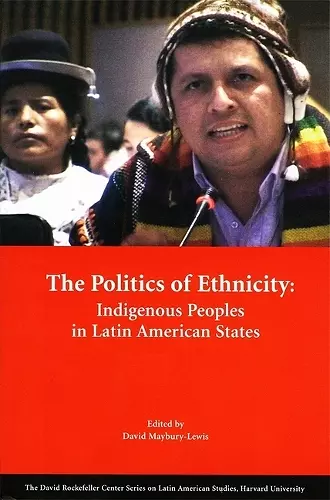The Politics of Ethnicity
Indigenous Peoples in Latin American States
Format:Paperback
Publisher:Harvard University, The David Rockefeller Center for Latin American Studies
Published:1st Mar '03
Currently unavailable, and unfortunately no date known when it will be back

The indigenous people of the hemisphere have resisted a five-hundred-year assault, fighting to maintain their cultural identities. During this time, authorities in the Americas have insisted that the toleration of indigenous societies and cultures would undermine their respective states. In recent years, however, the nations of the Americas have started to reverse themselves. They are altering their constitutions and proclaiming themselves multiethnic. Why is this happening now? The Politics of Ethnicity: Indigenous Peoples in Latin American States, edited by David Maybury-Lewis, helps us understand the reasons and history behind these times of transition.
The book provides a valuable overview of current problems facing indigenous peoples in their relation with national states in Latin America, from the highlands of Mexico to the jungles of Brazil. The traditional, sometimes centuries old, relations between states and indigenous peoples are now changing and being rediscussed. The collection, authored by U.S. and Latin American anthropologists using interdisciplinary approaches, enables the reader to understand these recent developments in a comparative framework. An ambitious and quite thorough collection, it is brought together skillfully by one of the discipline’s maître penseurs.
The result of a conference held Harvard in 2000, this collection of essays explores the contemporary impact of indigenous organizations and indigenista policies in Mexico, Guatemala, Panama, Colombia, Ecuador, Peru, Bolivia, Paraguay and Brazil… This is an excellent volume that explains the variety of routes taken by the ‘return of the Indian’ in nine Latin-American national contexts. Predictions made in 2000 when the papers were given have proved quite prescient and the collection will be much used in teaching and research. -- Guy Thomson * Bulletin of Spanish Studies *
[T]hese timely essays help explain the contradictory process by which recent indigenous uprisings have drawn so much attention on the international stage, while concurrently enjoying so few improvements within their respective nation states. As a reflection of the cutting edge of scholarly approaches to its field, this collection will become an important teaching tool for anthropological and historical courses specifically focused on indigenous resistance and a comprehensive complementary source to Latin American studies in general. -- Rene Harder Horst
The striking, world-wide, self-assertion by indigenous peoples is, surely, a most notable feature of our ‘turn-of-the-millennium.’ Nowhere is it more striking than in Latin America where assimilationist ideologies—whether violent and predatory or populist and peaceful—were recently so hegemonic. Nowhere is this great transformation examined with such originality, comprehensiveness, analytical care and nuance as here, in The Politics of Ethnicity. -- James C. Scott, Sterling Professor of Anthropology and Political Science, Yale University
Professor Maybury-Lewis and his colleagues provide the reader with a valuable analysis and a useful tool for the understanding of ongoing conflicts between indigenous peoples and states in various Latin American countries. A broad overview of the issues ranges from the local level to their international implications. This volume presents a clear picture of one of the least well-known yet most significant developments in the recent history of a number of Latin American societies. -- Rodolfo Stavenhagen, Colegio de México, Special Rapporteur on the Rights and Fundamental Freedoms of Indigenous Peoples, U.N. Human Rights Commission
This timely book is a sweeping anthropological vision of contemporary relations between the indigenous peoples of Latin America and the states that contain them. The resulting picture is an indictment for most Latin American nation states except for specific governments that have been able to respond to well-organized indigenous social and political movements. However, one central fact remains undisputed: the Latin American indigenous movement has provoked a most radical questioning of the models of nation-state, democracy, and development since the expansion of anarchistic and socialist theories in the late nineteenth century. -- Stefano Varese, Professor of Native American Studies, University of California, Davis
ISBN: 9780674009646
Dimensions: 229mm x 152mm x 25mm
Weight: 662g
410 pages